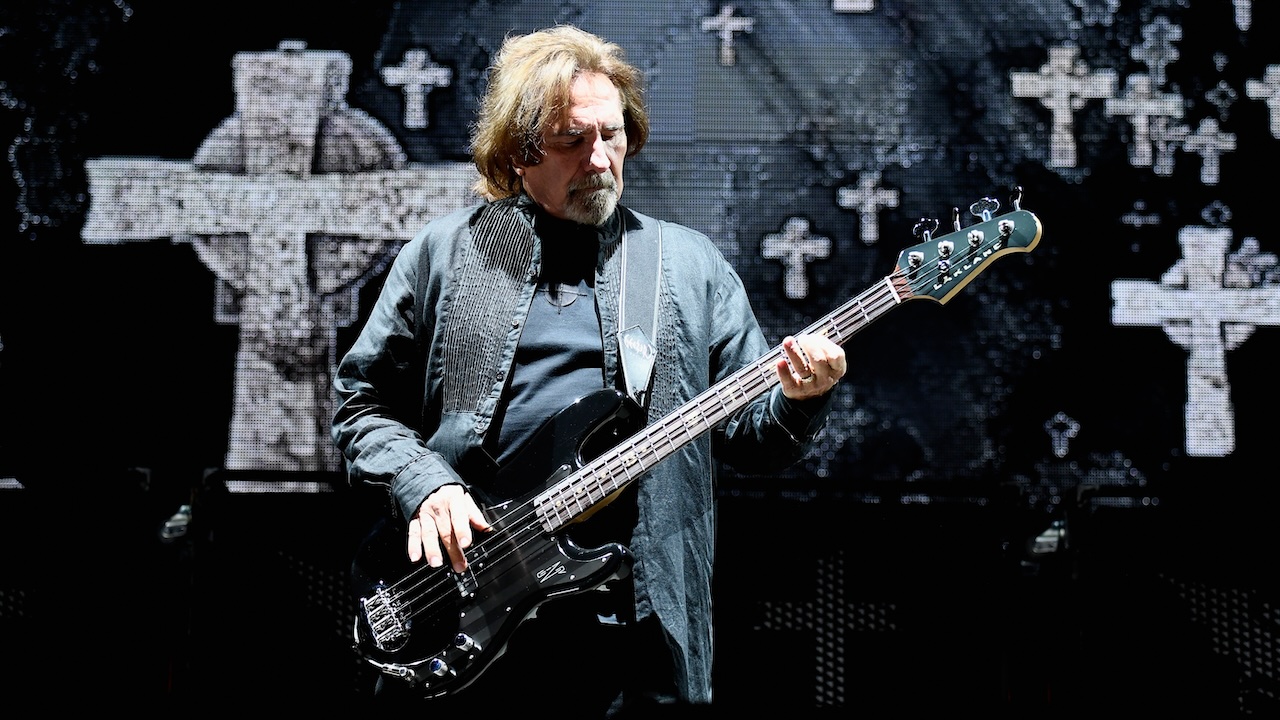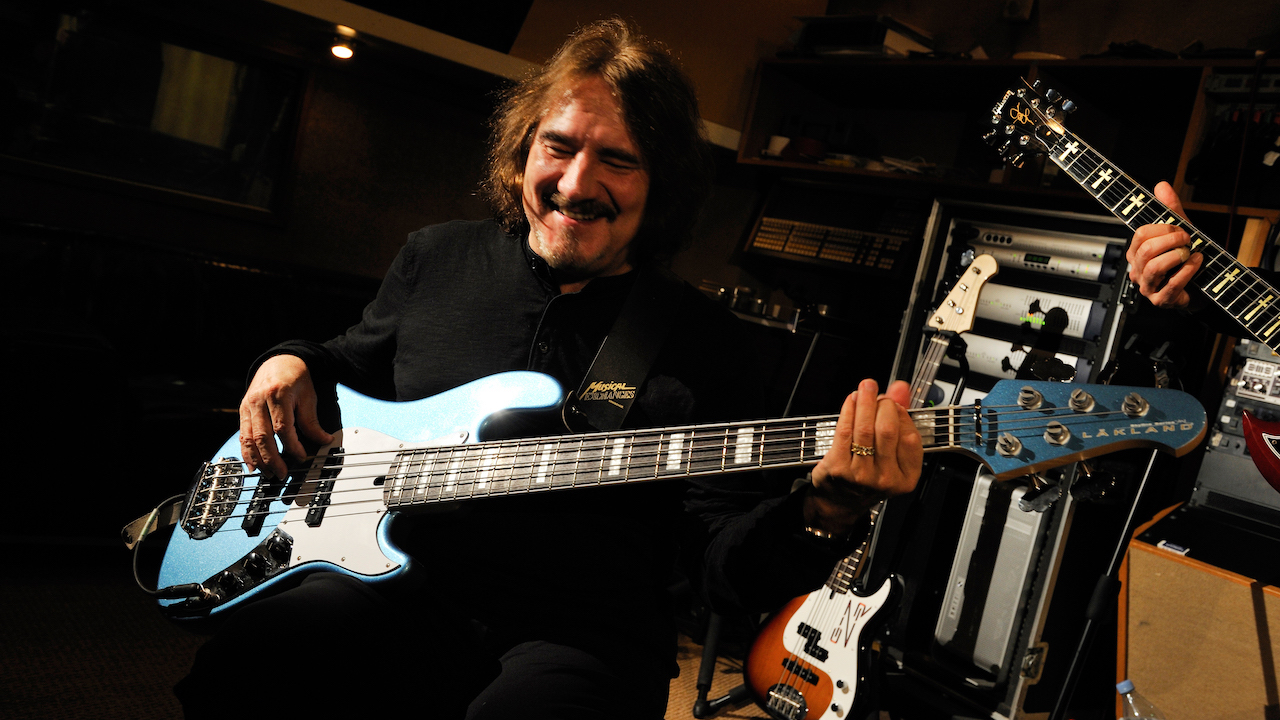“Everyone I've ever met that I worshipped has been a disappointment, so I want to keep him as my hero”: Geezer Butler names his favorite bassist of all time
His basslines with Black Sabbath are iconic, but Geezer Butler’s still a fan with his own four-string idols

Along with Roger Glover and John-Paul Jones, Terence ‘Geezer’ Butler represents the unholy trinity of 1970s British rock bass: unlike those esteemed players (of Deep Purple and Led Zeppelin respectively, like you didn't know that already), his band – the one and only Black Sabbath – can truly claim to have invented heavy metal, albeit inadvertently.
The HM tag – itself the obvious tag for a sound comprising Ozzy Osbourne's demented vocals, Tony lommi’s crushing, downtuned riffs and the rhythm section of Butler and drummer Bill Ward – later became ubiquitous, but Sabbath are acknowledged by pretty much everyone as the group who started it all off.
A bassist with much to answer for, then… but Butler is still a fan with his own bass guitar idols. “I didn’t really know anything about bass until I went to see Cream,” he told Bass Player. “Jack Bruce’s bass playing was a complete surprise.”
“I knew about Eric Clapton’s guitar playing because I’d followed him since he was in John Mayall’s Bluesbreakers. I was a guitarist at the time, so I’d never thought about bass – and Jack completely floored me.”
“I’d never seen anyone use bass as a sort of semi-lead instrument, while at the same time being perfectly linked to the drums and the guitar. The way he bent the notes and came down the fretboard was amazing, too.
“At the time he was playing a Fender [Bass] VI, which I’d never seen before – they were terrible! I couldn’t even play one note on them, let alone the way he used to play them. He must have incredibly thin fingers, or something…”
The following Bass Player interview took place in February 2006.
Get The Pick Newsletter
All the latest guitar news, interviews, lessons, reviews, deals and more, direct to your inbox!
Who’s your biggest influence on bass?
“Definitely, 100%, Jack Bruce. He's so underrated.”
He was in Bass Player not long ago. We've got his number if you want it?
“No! I don't want his number – everyone I've ever met that I worshipped has been a disappointment, so I want to keep him as my hero. I wouldn't know what to say to him. He worked on Bill Ward's solo album – Bill said he was great.”
So what’s so good about Bruce's bass playing?
“He was the first bass player I ever saw who was bending the strings and totally being on his own. At the time, when I saw him with Cream, he was playing a Fender VI, and they're horrendous to play. I tried one once but I couldn't do it, my fingers are too wide to get between the strings.”
What was your first bass?
“It was a thing called a Top 20. I think it was about 50p at a junk shop. I've never heard of them before or since. Originally I was playing rhythm guitar, then I switched to bass and got this Top 20 thing – I think I bought it off one of Ozzy's friends. And then on the way to the first gig, I borrowed my mate's Höfner violin bass, which only had three strings on it, and then eventually I swapped my Fender Telecaster for a Precision. I did the first two albums with that one.”
What basses are you currently using?
“I'm using Ampeg SVTs and Lakland basses… you can't beat them for my sound. They're modelled on Fender Precision and Jazz basses. The sound is like an old Fender, because I don't really like the new Fender stuff. I collect Fender basses, so I sort of know which sound I'm looking for – that old '60s sound.”

“I always used to play the wide Precision necks, but now I've started to like the Jazz necks as well. I vary it on stage because a lot of the songs are tuned to different keys. We tune down three semitones for some songs, some are two and some are one. It depends on what I'm tuned down to, what neck I use.”
Five-strings?
“I've tried them before, but I could never really get used to them. In fact, Lakland are just making me a five-string now. I've never had one that's great tuned down, even though you don't really need to tune a five-string down. They're just really flappy when you get into the studio. You can't really hear the bottom string.”
Do you use any effects?
“Not a lot, although I did use some Line 6 stuff on my Ohmwork album. I've got it sorted the way I want it, and use more or less the same sound on every track. When I'm recording, I do both – I use line-in and I mic up the amp, so I can balance the two. I also played piano on Alone and a couple of tiny little synthesizer effects on other songs.”
Do you play fretless?
“I've done a bit of it – I did a song on one of Ozzy's albums on fretless and another on a Sabbath album, but there's not really much room for fretless in heavy stuff like Sabbath.
“I like some Weather Report, and obviously you can't argue with Jaco Pastorius' bass playing. He did stuff that I'd never even thought about playing on bass. He was way out of my league!”
Joel McIver was the Editor of Bass Player magazine from 2018 to 2022, having spent six years before that editing Bass Guitar magazine. A journalist with 25 years' experience in the music field, he's also the author of 35 books, a couple of bestsellers among them. He regularly appears on podcasts, radio and TV.
“When I first heard his voice in my headphones, there was that moment of, ‘My God! I’m recording with David Bowie!’” Bassist Tim Lefebvre on the making of David Bowie's Lazarus
“One of the guys said, ‘Joni, there’s this weird bass player in Florida, you’d probably like him’”: How Joni Mitchell formed an unlikely partnership with Jaco Pastorius












